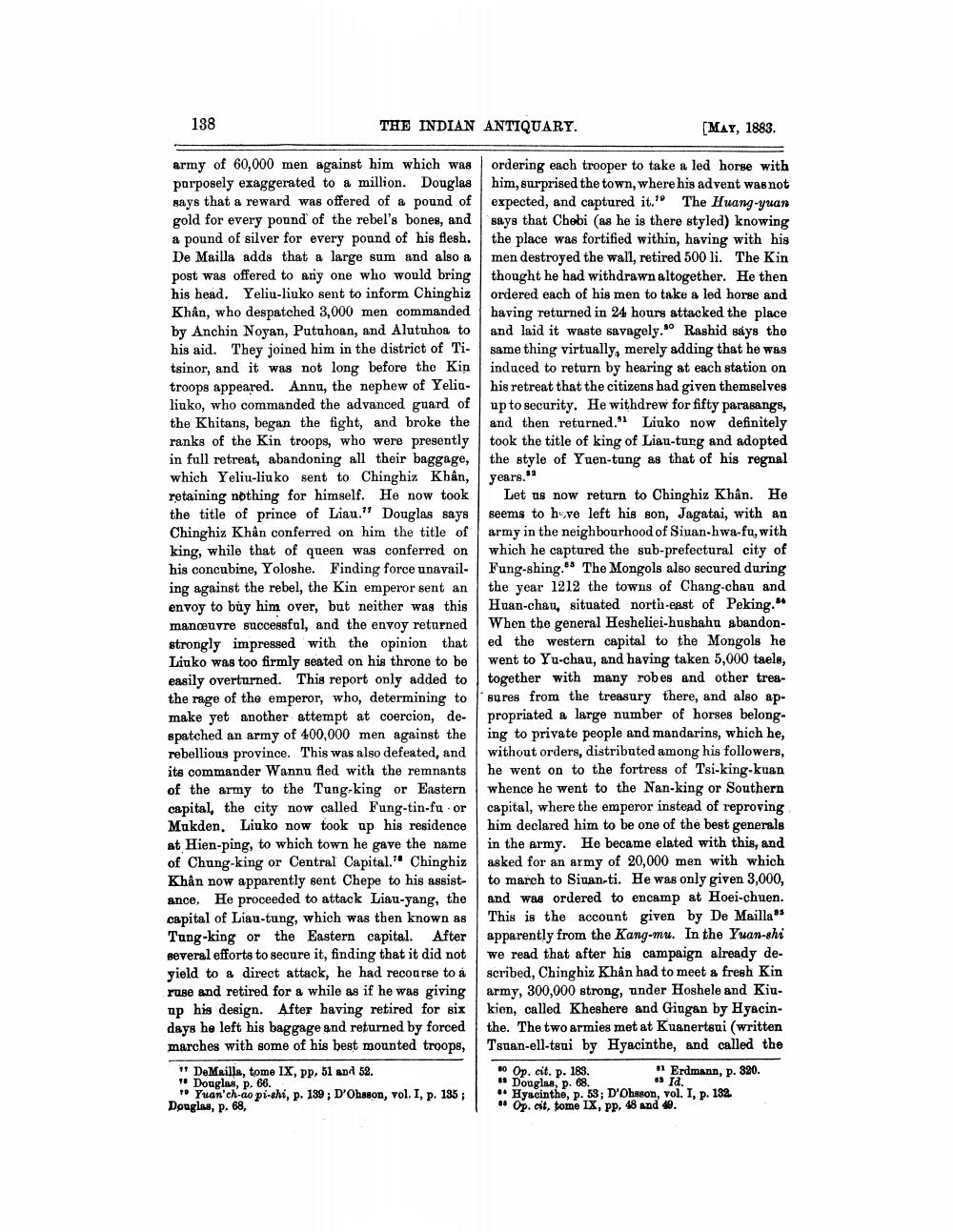________________
138
THE INDIAN ANTIQUARY.
[MAY, 1883.
army of 60,000 men against him which was purposely exaggerated to a million. Douglas says that a reward was offered of a pound of gold for every pound of the rebel's bones, and a pound of silver for every pound of his flesh. De Mailla adds that a large sum and also a post was offered to any one who would bring his head. Yeliu-liuko sent to inform Chinghiz Khân, who despatched 3,000 men commanded by Anchin Noyan, Putahoan, and Alutuhoa to his aid. They joined him in the district of Titsinor, and it was not long before the Kin troops appeared. Annu, the nephew of Yelialiuko, who commanded the advanced guard of the Khitans, began the fight, and broke the ranks of the Kin troops, who were presently in full retreat, abandoning all their baggage, which Yeliu-liuko sent to Chinghiz Khân, retaining nothing for himself. He now took the title of prince of Liau." Douglas says Chinghiz Khân conferred on him the title of king, while that of queen was conferred on his concubine, Yoloshe. Finding force unavail. ing against the rebel, the Kin emperor sent an envoy to buy him over, but neither wag this manoeuvre successful, and the envoy returned strongly impressed with the opinion that Liuko was too firmly seated on his throne to be easily overturned. This report only added to the rage of the emperor, who, determining to make yet another attempt at coercion, de spatched an army of 400,000 men against the rebellious province. This was also defeated, and its commander Wannu fled with the remnants of the army to the Tang-king or Eastern capital, the city now called Fung-tin-fuor Mukden. Liuko now took up his residence at Hien-ping, to which town he gave the name of Chung-king or Central Capital." Chinghiz Khân now apparently sent Chepe to his assistance. He proceeded to attack Liau-yang, the capital of Liau-tung, which was then known as Tang-king or the Eastern capital. After several efforts to secure it, finding that it did not yield to a direct attack, he had recourse to å ruse and retired for a while as if he was giving op his design. After having retired for six days he left his baggage and returned by forced marches with some of his best mounted troops,
" De Mailla, tome IX, pp, 51 and 52. "Douglas, p. 66. ** Yuan ch-ao pi-shi, p. 139; D'Ohsson, vol. I, p. 185 ; Douglas, p. 68,
ordering each trooper to take a led horse with him, surprised the town, where his advent was not expected, and captured it." The Huang-yuan says that Chobi as he is there styled) knowing the place was fortified within, having with his men destroyed the wall, retired 500 li. The Kin thought he had withdrawn altogether. He then ordered each of his men to take a led horse and having returned in 24 hours attacked the place and laid it waste savagely.So Rashid says the same thing virtually, merely adding that he was induced to return by hearing at each station on his retreat that the citizens had given themselves up to security. He withdrew for fifty parasangs, and then returned." Liuko now definitely took the title of king of Liau-turg and adopted the style of Yuen-tung as that of his regnal years."
Let us now return to Chinghiz Khân. He seems to huve left his son, Jagatai, with an army in the neighbourhood of Siuan-hwa-fu, with which he captured the sub-prefectural city of Fung-shing. The Mongols also secured during the year 1212 the towns of Chang-chau and Huan-chau, situated north-east of Peking." When the general Hesheliei-hushahu abandoned the western capital to the Mongols he went to Yu-chau, and having taken 5,000 taels, together with many robes and other treasures from the treasury there, and also appropriated a large number of horses belonging to private people and mandarins, which he, without orders, distributed among his followers, he went on to the fortress of Tsi-king-kuan whence he went to the Nan-king or Southern capital, where the emperor instead of reproving him declared him to be one of the best generals in the army. He became elated with this, and asked for an army of 20,000 men with which to march to Siuan-ti. He was only given 3,000, and was ordered to encamp at Hoei-chuen. This is the account given by De Mailla" apparently from the Kang-mu. In the Yuan-shi we read that after his campaign already described, Chinghiz Khân had to meet a fresh Kin army, 300,000 strong, under Hoshele and Kiukien, called Kheshere and Gingan by Hyacinthe. The two armies met at Kuanertsui (written Tsuan-ell-tsui by Hyacinthe, and called the
80 Op. cit. p. 183. * Douglas, p. 68. " Hyacinthe, p. 53; D'Ohason, vol. I, p. 132. • Op.cit, tome IX, PP, 48 and 49.
Erdmann, p. 320.




